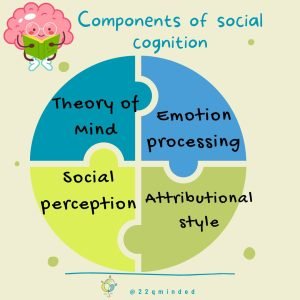What is it?
Social cognition encompasses skills related to understanding and navigating social situations, such as recognising emotions, interpreting social cues, empathising with others, and effectively communicating in various contexts.
Components of social cognition
-
-
- Theory of Mind: Understanding others’ thoughts and intentions.
- Emotion Processing: Recognizing people’s emotions.
- Social Perception: Interpreting social cues.
- Attributional Style: Explaining social interactions
-
How do these skills develop?
Although we have biological underpinnings for social cognition, its growth hinges on life experiences and continuous practice. Some people may find it more challenging to grow these abilities, necessitating increased repetition and guidance to foster their social cognitive development.
What about 22q?
Concerns about social skills, friendships and relationships are very common among parents of kids with 22q, both deletion and duplication. Many children with the deletion are described as socially immature, withdrawn, and shy. There are also challenges in initiating and forming lasting social relationships.
What is modelling?
Parents play a crucial role in fostering their children’s social cognition. By providing opportunities for social interactions and encouraging discussions about emotions, perspectives, and social dynamics, parents can help their kids develop a deeper understanding of the social world. Parents can model empathetic and effective communication behaviours, offering valuable guidance for social skill development.
What can help?
- Talk about different emotions and how you recognise them in yourself and others.
- Label your own emotions and experiences
- Be explicit, don’t assume.
- Do social role plays and emotion charades
- Use social stories and discuss social scenes
- Play games where you have to take others’ perspectives.
- Empathy games
- Storytelling with multiple perspectives





